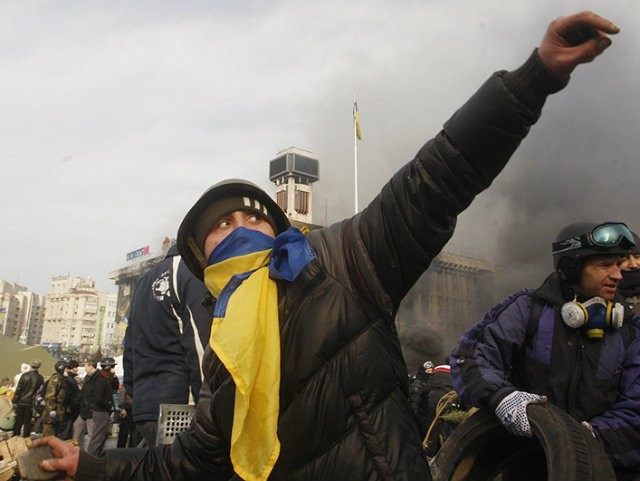A House of Lords committee has claimed Britain and other EU nations “sleepwalked” into the crisis in the Ukraine, accusing leaders of “catastrophic misreading” of the mood in the Kremlin.
Peers on the House of Lords EU Scrutiny Committee said Europe had not realised the depth of Russian hostility to the Ukraine negotiations, which primarily took place with Francois Hollande and Angela Merkel, as events in the country turn the ‘ceasefire’ into a Munich Agreement style farce, the BBC reports.
European Council President Donald Tusk called British Prime Minister David Cameron to discuss the response as Russia maintained hostilities.
It comes as Defence Secretary Michael Fallon warned that President Putin poses a “real and present danger” to the Baltic states.
The committee report said Britain had not been “active or visible” enough as it should have been, particularly in light of the country being one of the signatures to the 1994 Budapest Memorandum which pledged to respect Ukraine’s territorial integrity. And it put a significant emphasis on Foreign Office cut backs, saying there were ‘fewer Russian experts and less emphasis on analysis’.
These cut backs could be due to the whole of the EU having what the report calls an “optimistic premise” that Russia is on the path to being a democratic country. This, the report says, has weakened all member states’ ability to read the political shifts and to offer an authoritative response.
Peers concluded that the Foreign and Commonwealth Office (FCO) should “review how such skills could be renewed and how analysis can feed into the decision making process.”
But it points out there has been an increase in staff at the FCO to deal with the Ukraine and Russia but they had not seen any evidence that this uplift “is part of a long term rebuilding of deep knowledge of the political and local context in Russia and the region.”
There was a failure to realise the consequences of the 2013 Ukraine accession agreements to the EU, the committee said, with Chairman Lord Tugenhat warning: “The lack of robust analytical capacity, in both the UK and the EU, effectively lead to a catasrophic misreading of the mood in the run up to the crisis,” adding that neither Britain or the EU had any long term strategic response.
UKIP Defence Spokesman Mike Hookem MEP said the report “vindicated” what he and other colleagues had been saying about the EU’s attitude towards Russia. “This situation has been caused by the EU” he told Breitbart London, “and the report shows that UKIP have been categorically on the right track over the prodding of Russia by Brussels.”
It would be a failure of imagination and diplomacy, Peers reported, if the crisis in the Ukraine were to result in a long-lasting era of colder relations and reduced cooperation especially when there is the capacity to bring about political change which would be more successful if coupled with a willingness to engage with Russia on broader issues such as a common economic space and cultural relations.
Both Mr Tusk and Mr Cameron said they had “deep concern” about the Russian backed fighters who continue to attack Debaltsere despite the ceasefire and they made clear the response would be at an EU level.
But this reliance on an EU policy could leave the UK in a vulnerable position, particularly since it was reported that the Germans have so neglected their armed forces that soldiers are now reduced to training with broom handles instead of rifles and geopolitical tensions are also complicated by an energy policy which has left some EU countries scarily reliant on Russian oil and gas.
Sir Andrew Wood, former UK Ambassador to Russia, called the situation a “dangerous moment” which could overspill into the Baltic regions, a message which will ring loudly in the ears of those responsible for the 2010 SDSR which has been once again slated for decimating the Armed Forces, leaving the country unable to counter a Russian attack should it come.

COMMENTS
Please let us know if you're having issues with commenting.